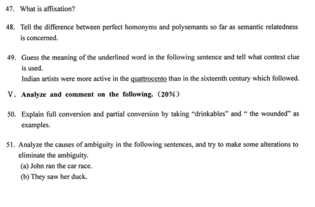英语本科词汇学真题(英语词汇学翻译精华整理)
1.自考英语词汇学翻译精华整理
去百度文库,查看完整内容>内容来自用户:季显轮English Lexicology(英语词汇学)1.English lexicology aims at investigating and studying the morphological structures of English words and word equivalents, their semantic structures, relations, historical development, formation and usages.英语词汇学旨在调查和研究英语单词和单词的等价物的形态结构,其语义结构、关系、历史发展、形成和用法。
2.English Lexicology is correlated with such linguistic disciplines as morphology(形态学), semantics(语义学), etymology(词源学),stylistics(文体论)and lexicography(词典学)Chapter 1--Basic concepts of words and vocabulary1.Word(词的定义):A word is a minimal free form of a language that has a given sound and meaning and syntactic function. (1)a minimal free form of a language (2)a sound unity (3)a unit of meaning (4)a form that can function alone in a sentence词语是语言最小的自由形式,拥有固定的声音和意义以及句法作用。2.Sound and meaning(声音与意义): almost arbitrary, “no logical relationship between the sound which stands for a thing or an idea and the actual thing and idea itself”词语是一个符号,代表着世界上其他的事物。
每种世界文化已经赞成一定的读音将代表一定的人,事,地方,特性,过程,行动,当然是在语言系统之外。这种象征。
2.自考本科,英语词汇学该怎么复习,时间不多了,打算直接买习题做,
考试规律总结
1,自考的内容就是教辅《自考通》或《一考通》上的重点提示或原题。多做教辅习题。
2,自考历年试卷上考点有些重复考,最近四年的试卷要多做。模拟试卷要多做。
3,考试前三周死拼教辅。光看教材效果不显著,多关注教辅才是关键。
4,考试难度大的题目占百分三十不到,将简单题和中等题掌握就行了。
5,如果是记忆的话:将每段话的第一句强记住,后面的内容掌握大义即可。文科和理科有区别的,文科宏观性强。只要你答题不跑偏,大义写对就可捞分。
6,多项选择实在拿不了主意:ABCDE全选满,总能碰对几分。
7,考前三周反复做《自考通》或《一考通》,记住重点提示和习题。模拟试卷和历年试卷上的题目每天做一套,力争全面掌控。
3.英语词汇学考试重点章节
Chapter 11 - The definition of a word comprises the following points:(1) a minimal free form of a language;(2) a sound unity;(3) a unit of meaning;(4) a form that can function alone in a sentence.A word is a minimal free form of a language that has a given sound and meaning and syntactic function.2- Sound and Meaning: symbolic connection is almost always arbitrary and conventional.A dog is called a dog not because the sound and the three letters that make up the word just automatically suggest the animal in question.3- Old English, the speech of the time was represented very much more faithfully in writing than it is today. The internal reason for this is that the English alphabet was adopted from the Romans, which does not have a separate letter to represent each sound in the language so that some letters must do double duty or work together in combination.Another reason is that the pronunciation has changed more rapidly than spelling over the years, and in some cases the two have drawn far apart. 4-A third reason is that some of the differences were created by the early scribes.Finally comes the borrowing, which is an important channel of enriching the English vocabulary.5 - Vocabulary: All the words in a language make up its vocabulary. Not only can it refer to the total number of the words in a language, but it can stand for all the words used in a particular historical period. We also use it to refer to all the words of a given dialect, a given book, a given discipline and the words possessed by an individual person. The general estimate of the present-day English vocabulary is over million words.words used in a particular historical period. We also use it to refer to all the words of a given dialect, a given book, a given discipline and the words possessed by an individual person. The general estimate of the present-day English vocabulary is over million words.words used in a particular historical period. We also use it to refer to all the words of a given dialect, a given book, a given discipline and the words possessed by an individual person. The general estimate of the present-day English vocabulary is over million words.words used in a particular historical period. We also use it to refer to all the words of a given dialect, a given book, a given discipline and the words possessed by an individual person. The general estimate of the present-day English vocabulary is over million words.6 - Words may fall into the basic word stock and nonbasic vocabulary by use frequency, into content words and functional words by notion, and into native words and borrowed words by origin.7 - The basic word stock is the foundation of the vocabulary accumulated over centuries and forms the common core of the language. Though words of the basic word stock constitute a small percentage of the English vocabulary, yet it is the most important part of it. These words have obvious characteristics.8 - All national character. Words of the basic word stock denote the most common things and phenomena of the world around us, which are indispensable to all the people who speak the language Natural phenomena/Human body and relations/Names of plants and animals/Action, size, domain, state/Numerals, pronouns, prepositions, conjunctions9 - Stability. Words of the basic word stock have been in use for centuries.10 - Productivity . Words of the basic word stock are mostly root words or monosyllabic words. They can each be used alone, and at the same time can form new words with other roots and affixes.11 - Polysemy. Words belonging to the basic word stock often possess more than one meaning because most of them have undertone semantic changes in the course of use and become polysemous.12 - Collocability . Many words of the basic word stock quite a number of set expressions, idiomatic usages, proverbial sayings and the like.13 - Terminology consists of technical terms used in particular disciplines and academic areas .14 - Jargon refers to the specialized vocabularies by which members of particular arts, sciences, trades and professions communicate among themselves such as in business.15 - Slang belongs to the sub-standard language, a category that seems to stand between the standard general words including informal ones available to everyone and in-group words like cant, jargon, and argot, all of which are associated with, or most available to, specific groups of the population.Slang is created by changing or extending the meaning of existing words though some slang words are new coinages altogether. Slang is colourful, blunt, expressive and impressive.16 - Argot 。

相关推荐
声明:本网站尊重并保护知识产权,根据《信息网络传播权保护条例》,如果我们转载的作品侵犯了您的权利,请在一个月内通知我们,我们会及时删除。
蜀ICP备2020033479号-4 Copyright © 2016 学习鸟. 页面生成时间:4.552秒








